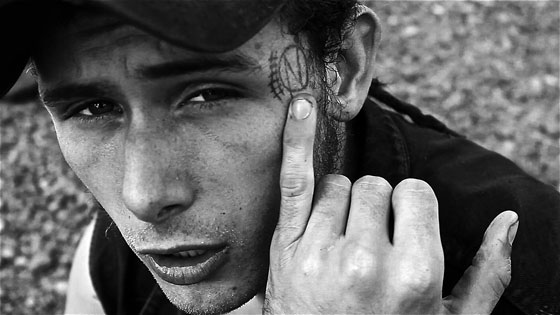Brandon Isaacson: What brought you from Environmental Studies and operating an organic vegetable farm to making a documentary?
Daniel Skaggs: I had a train riding and traveling history, and a love for documentary film. About seven years ago, I came up with the idea for a doc about train hopping. I was operating an organic veggie farm and working at a health food store, when I met one of my partners. Him and a friend were graduating from the Media Arts program in Missoula, so I thought it would be the perfect time to finally make it happen. It took a couple months of persuading, but they were hooked.
BI: You’re following people that live dangerous lives, who are wandering throughout the country, probably without phones or email. How hard was this film to make logistically? How big was your crew?
DS: In the beginning, FREELOAD was a logistical nightmare. My editors followed me around the country for almost three months. We would meet up and swap memory cards/hard drives. This just didn't work for many reasons. For the next fifteen months we mailed memory cards around the country. They were located in Seattle at the time and I was in a different place everyday. This was the most convenient and financially feasible method.
Technically, our crew was four people, but for three of us it was a full time job. It consumed our lives. We handled every stage of the film making process ourselves.
BI: Within 9 minutes, you put your characters in NYC at Occupy Wall Street. Why did you include this moment?
DS: It was an interesting time in America. The occupy movement was happening in cities from Oakland to NYC. As a traveler and filmmaker, I was curious about the movement, so I stopped at every occupy encampment possible. The Occupy Wall Street scene is an interesting juxtaposition between the train riding community and the occupiers. Blackbird and Skrappe, as you saw in the movie, were not fans of occupy. They were fans of the free food and place to sleep. Most Occupy's offered both.
BI: Throughout the film, the characters are often drinking. Blackbird even admits that his drinking is alcoholism, and the alcohol is “…like a bandage.” Do you agree? Why do you think people on such a limited budget spend so much on alcohol?
DS: As you see in the movie, this is a very hard life. Drinking is a major part of it. Drinking passes the time and also alters the reality. Yes, I do believe that drinking is a bandage for most train riders. Substance abuse and alcoholism are wide spread.
Alcohol does cost money, but it makes the immediate problems disappear. And so does waking up and drinking the next day and the next day, until your liver fails or you fall off a train and die.
BI: What do you expect for the future of the film in terms of distribution methods or a long festival circuit run? Or is it too early to say?
DS: IFF Boston will be our sixth festival and we plan on doing the circuit all year. We are currently soliciting distribution, but it's hard out there for a starving filmmaker. It is still early in the game. IFF Boston is an important festival for us right now. At this point, we are wide open to suggestions, deals, and donations. After all, we are traveling, broke, and hungry.

 RSS Feed
RSS Feed
